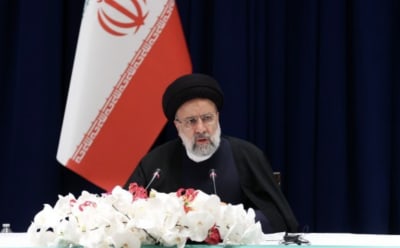Iranian President Ebrahim Raisi (Photo: Office of the President of the Islamic Republic of Iran)
Iranian President Ebrahim Raisi warned other Arab nations in the Middle East against normalizing relations with Israel.
“The normalization of relations with the Zionist regime does not create security,” Raisi cautioned media executives during a meeting on the sidelines of the United Nations General Assembly in New York on Monday.
The warning comes against the background of ongoing negotiations between the United States, Saudi Arabia, Israel and the Palestinian Authority about a mega-deal that would include normalization between the Saudi Kingdom and Israel.
Former archrivals Saudi Arabia and Iran only mended their ties in March and exchanged ambassadors after years of tensions.
The U.S. and Iran on Monday also completed a controversial prisoner swap deal, which includes a transfer of $6 billion dollars to the Iranian regime from South Korea.
Raisi said his country “sought good relations with all neighboring countries” in the Middle East, including Saudi Arabia and the United Arab Emirates.
“We believe that if the Americans stop interfering in the countries of the Persian Gulf and other regions in the world and mind their own business… the situation of the countries and their relations will improve,” he added.
The Iranian president denied that his country supported Russia’s war against Ukraine by providing them with drones and other military supplies, however, he did acknowledge that Iran and Russia have long had strong ties, including defense cooperation.
Raisi claimed if Washington had “a document [proving] that Iran gave weapons or drones to the Russians,” that they should produce it, according to UAE-based newspaper The National.
“We are against the war in Ukraine,” Raisi stressed while offering to mediate between the parties.
Before Raisi arrived in the U.S., the Israeli Consulate in New York placed life-size cutouts of Raisi around the city to remind Americans that he is barred from visiting these sites due to sanctions against him for human rights abuses.
Raisi became known as the “Butcher of Tehran” for his role in the 1988 execution of political prisoners following the Islamic Revolution in Iran.
